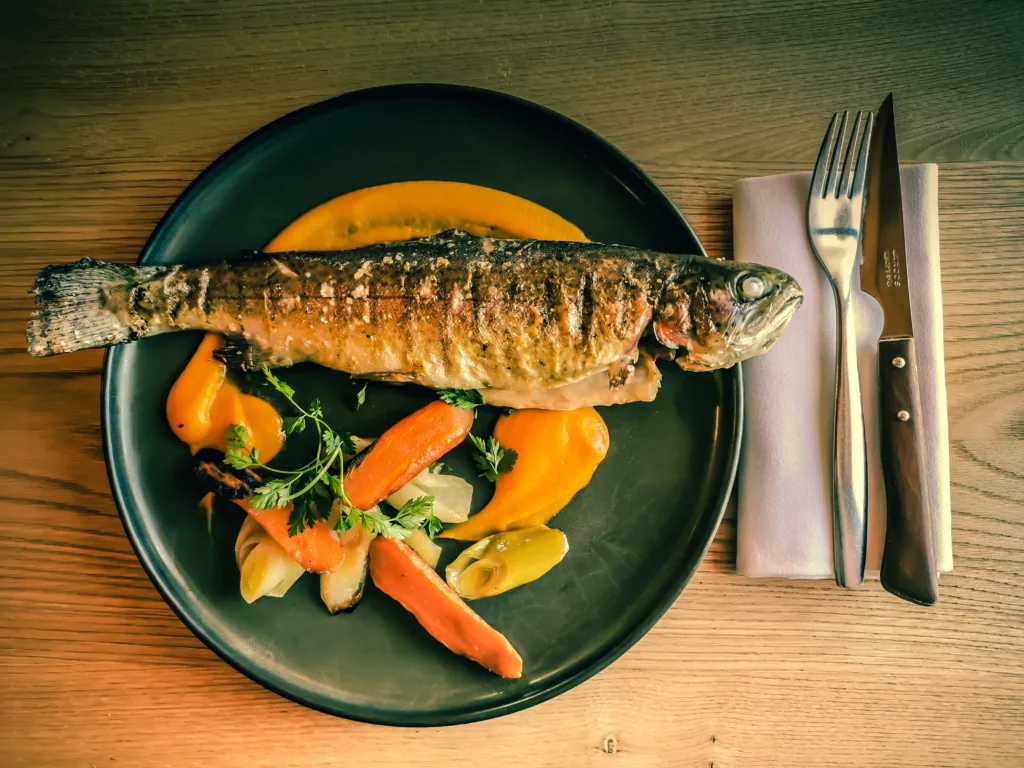Good Friday is an important day in the Christian calendar, commemorating the crucifixion of Jesus Christ. It is a solemn day of reflection and prayer for believers around the world. One of the traditional practices observed on Good Friday is abstaining from eating meat. But what can you eat on this significant day?
According to Catholic traditions, abstaining from meat on Good Friday is a way to remember and honor the sacrifice made by Jesus. By avoiding meat, which symbolizes flesh, believers are reminded of the ultimate sacrifice Jesus made for humanity. This act of abstaining is seen as a form of penance and self-discipline.
So, if you’re Catholic and looking for alternatives to meat on Good Friday, here are some options to consider:
1. Fish: Seafood, specifically fish, is a popular choice for Good Friday meals. Many Catholics opt for fish as a substitute for meat on this day. It’s a versatile and healthy protein option that can be prepared in various ways. Grilled, baked, or even in the form of fish tacos, there are plenty of delicious fish recipes to choose from.
2. Vegetarian Dishes: Good Friday is an excellent opportunity to explore vegetarian cuisine. There are countless vegetarian recipes that are both nutritious and satisfying. From hearty vegetable soups to flavorful pasta dishes, the options are endless. You can experiment with different vegetables, legumes, and grains to create a filling and tasty meal.
3. Seafood Pasta: Combining the goodness of seafood and pasta, seafood pasta dishes are a popular choice on Good Friday. Whether it’s shrimp, scallops, or clams, adding them to a pasta dish creates a flavorful and indulgent meal. Pair it with a light tomato or cream-based sauce, and you have a delicious Good Friday dinner.
4. Egg Dishes: Eggs are another great alternative to meat on Good Friday. They are a symbol of new life and are often associated with Easter. From omelets to quiches, eggs can be used to create a variety of savory dishes. You can add vegetables, cheese, and herbs to make them more flavorful and satisfying.
5. Lentil Soup: Lentils are a common ingredient in many vegetarian dishes, and lentil soup is no exception. Packed with protein and essential nutrients, lentil soup is a hearty and comforting option for Good Friday. You can add vegetables, spices, and herbs to enhance the flavors and make it a wholesome meal.
Remember, the purpose of abstaining from meat on Good Friday is not to deprive oneself but to reflect on Jesus’ sacrifice. It is a day of prayer and contemplation, and the choice of food should align with the solemnity of the occasion.
As with any dietary restrictions, it’s essential to consider individual preferences and dietary needs. While these options are commonly followed by Catholics, it’s always advisable to consult with a religious leader or follow the guidelines of your specific faith tradition.
So, this Good Friday, if you’re looking for meat-free alternatives, try incorporating fish, vegetarian dishes, seafood pasta, egg dishes, or lentil soup into your meals. Remember to embrace the spirit of the day and use this opportunity for introspection and gratitude.
Are You Not Allowed To Eat Meat On Good Friday?
According to the rules of the Catholic Church, consuming meat is not permitted on Good Friday. Good Friday is one of the most significant days in the Christian calendar, as it commemorates the crucifixion of Jesus Christ. As a sign of penance and sacrifice, Catholics are required to abstain from eating meat on this day.
This rule is not limited to Good Friday alone. It also applies to Ash Wednesday, which marks the beginning of the Lenten season, and all Fridays during Lent. Lent is a period of forty days leading up to Easter, during which Catholics engage in prayer, fasting, and acts of self-discipline.
The abstinence from meat on these specific days is considered a way of denying oneself and sharing in the sacrifice of Jesus Christ. By abstaining from meat, Catholics are encouraged to focus on spiritual reflection and to contemplate the suffering of Jesus on the cross.
It is important to note that the requirement to abstain from meat on Good Friday and other specified days of Lent applies to individuals who have reached the age of 14 and above. Younger children are not obligated to follow this practice.
This tradition of abstaining from meat on Good Friday and during Lent has been observed by Catholics for centuries. It is seen as a way of preparing oneself for the celebration of Easter, the resurrection of Jesus Christ.

Can You Eat On Good Friday Catholic?
On Good Friday, Catholics are required to observe both fasting and abstinence. This means that they are to abstain from eating meat and to limit their intake of food. The age range for these obligations is from 18 to 59 years old for members of the Latin Catholic Church.
Here are some important points to note regarding eating on Good Friday for Catholics:
1. Fasting: This refers to the limitation of food intake to one full meal and two smaller meals that, together, do not equal a full meal. These meals should not contain meat. Snacking between meals should be avoided, but liquids, such as water, coffee, tea, and juice, are allowed.
2. Abstinence: This means refraining from eating meat on Good Friday. The purpose of abstinence is to remind Catholics of the sacrifice Jesus made on this day. However, fish and other seafood are allowed on this day, making them a popular choice for meals.
3. Exceptions: While fasting and abstinence are obligatory for Catholics on Good Friday, there are exceptions for those with health conditions or other legitimate reasons. Pregnant or nursing women, the elderly, and those with certain medical conditions are exempt from fasting but are still encouraged to practice abstinence.
4. Other Lenten Fridays: It’s important to note that abstinence from meat is also required on Fridays during Lent, leading up to Easter Sunday. However, fasting is not obligatory on these Fridays, except for Good Friday.
5. Spiritual significance: Fasting and abstinence are not merely acts of self-denial but are meant to foster a deeper spiritual reflection during the Lenten season. By abstaining from certain foods and limiting their intake, Catholics seek to draw closer to God and remember the sacrifice of Jesus.
It’s important to consult with local dioceses or parishes as specific guidelines may vary. These guidelines are provided to help Catholics observe Good Friday in accordance with the teachings of the Church.
Can You Eat Bread On Good Friday?
It is permissible to eat bread on Good Friday. In the Christian tradition, Good Friday is a day of fasting and abstinence, which means that Catholics and some other Christian denominations abstain from eating meat and have only one full meal during the day. However, bread is not considered meat, so it is allowed to be consumed on Good Friday.
Bread is a staple food in many cultures and is not specifically restricted on Good Friday. It can be consumed as part of the one full meal or as a snack throughout the day. It is important to note that the specific customs and traditions regarding food on Good Friday may vary among different Christian denominations and individuals.
If you have any specific dietary restrictions or follow a different religious practice, it is recommended to consult with your religious leader or refer to the guidelines provided by your religious community. They will provide you with accurate information tailored to your specific beliefs and practices.
Eating bread on Good Friday is generally acceptable and does not go against the traditional customs and practices associated with this religious observance.
Can You Eat Dinner On Good Friday?
On Good Friday, Catholics are expected to observe the tradition of fasting and abstaining from eating meat. This tradition is followed as a way to commemorate Jesus’ sacrifice on the cross. The rules of fasting on Good Friday state that Catholics between the ages of 18 and 59 are required to fast, which means limiting their food intake.
During fasting, a person is allowed to eat one full meal, which should be sufficient to sustain them throughout the day. This meal should not include any meat, as the tradition of abstaining from meat on Good Friday is meant to symbolize the flesh of Jesus. It is important to note that the rules of fasting may vary slightly depending on the individual’s diocese or local church.
In addition to the one full meal, Catholics may have two smaller meals or snacks, as long as they do not add up to a full meal. These smaller meals or snacks should also not include any meat. It is recommended to choose foods that are simple and not overly indulgent during this time.

Conclusion
Good Friday holds significant religious and cultural importance for Catholics around the world. It is a day of fasting and abstinence, where individuals of age 14 and above are required to abstain from consuming meat. This practice symbolizes the sacrifice of Jesus Christ, reminding believers of his ultimate sacrifice for humanity. Catholics between the ages of 18 and 59 are also expected to fast on this day, which involves eating only one full meal. The traditions and customs surrounding Good Friday, including the consumption of special buns and the observance of solemn religious services, vary across different cultures and regions. However, the underlying purpose remains the same – to reflect on the passion and death of Jesus Christ and to express gratitude for his sacrifice. Good Friday serves as a solemn and contemplative day for Catholics, providing an opportunity for prayer, reflection, and spiritual renewal.
